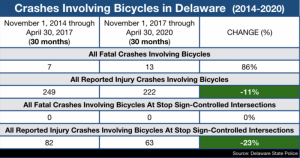A controversial Delaware law that allows bicyclists to ride through stop signs without stopping if the intersection is clear is set to expire in October.
However, Bike Delaware, a nonprofit group that advocates for safe bicycling, would like to see the Delaware Yield become a permanent law.
James Wilson, executive director of Bike Delaware, says a 60-month study by Delaware State Police found that bicycle-involved crashes at stop sign intersections dropped more than 20 percent after the Delaware Yield was enacted in 2017.
“This data actually exists,” he said during a Feb. 11 meeting with Lewes Mayor and City Council. “We don’t have to go with what feels right … we actually have the data.”
The Delaware Yield became a controversial subject shortly after state officials opened the Lewes-to-Georgetown Trail, which has 12 road crossings in a six-and-a-half-mile stretch from the Lewes-Rehoboth Canal to Route 9 in Cool Spring. Frustrations culminated at a public meeting hosted by Sen. Ernie Lopez, R-Lewes, at the Lewes Public Library in July 2019, with many residents calling for the law to be repealed.
Since then, the state has added signage and other equipment to alert both bicyclists and drivers as they approach trail crossings.
Wilson said he agrees that there are problems on the Lewes-to-Georgetown Trail, but they are unrelated to the issue of the Delaware Yield.
“The concerns about the trail crossings are absolutely legitimate,” he said. “Your crossings are not as well designed as the Markell Trail crossings up in New Castle County where there are no problems, nobody is complaining and there are no issues.”
Wilson said the Delaware Department of Transportation has contracted with a national engineering firm to develop a plan to improve safety at Lewes-to-Georgetown Trail road crossings, but he has not yet seen what’s proposed or planned.
Wilson was not able to convince Lewes Mayor and City Council to support House Bill 36 to make the Delaware Yield permanent. Lewes officials instead followed the guidance of the town’s bicycle and pedestrian advisory committee, which took the opposite position.
Robert Fischer, a committee member, said while the Delaware Yield law is similar to what can be found in other countries, it does not work in Delaware.
“I do not think it is in the best interest of safety to continue this,” he said at the committee’s Jan. 26 meeting. “This is, in my estimation, dangerous.”
Don Long, committee chair, agreed the law as written is confusing for bicyclists.
“When it’s left up to the judgment of the cyclist to make the decision at the intersection, you have issues,” he said. “There are going to be issues constantly.”
Deputy Mayor Bonnie Osler suggested the city write a letter in opposition to House Bill 36, which would make the Delaware Yield permanent. In the letter, she said, the city should urge DelDOT to reevaluate and fund necessary safety improvements to road crossings.
Speaker of the House Rep. Pete Schwartzkopf, D-Rehoboth Beach, has been critical of the Delaware Yield at Five Points Working Group meetings, but sponsors of the bill include Senate President Pro Tempore David Sokola, D-Newark, and House Majority Whip Rep. John Mitchell, D-Elsmere. HB 36 currently sits in the House’s transportation/land use and infrastructure committee.






















































